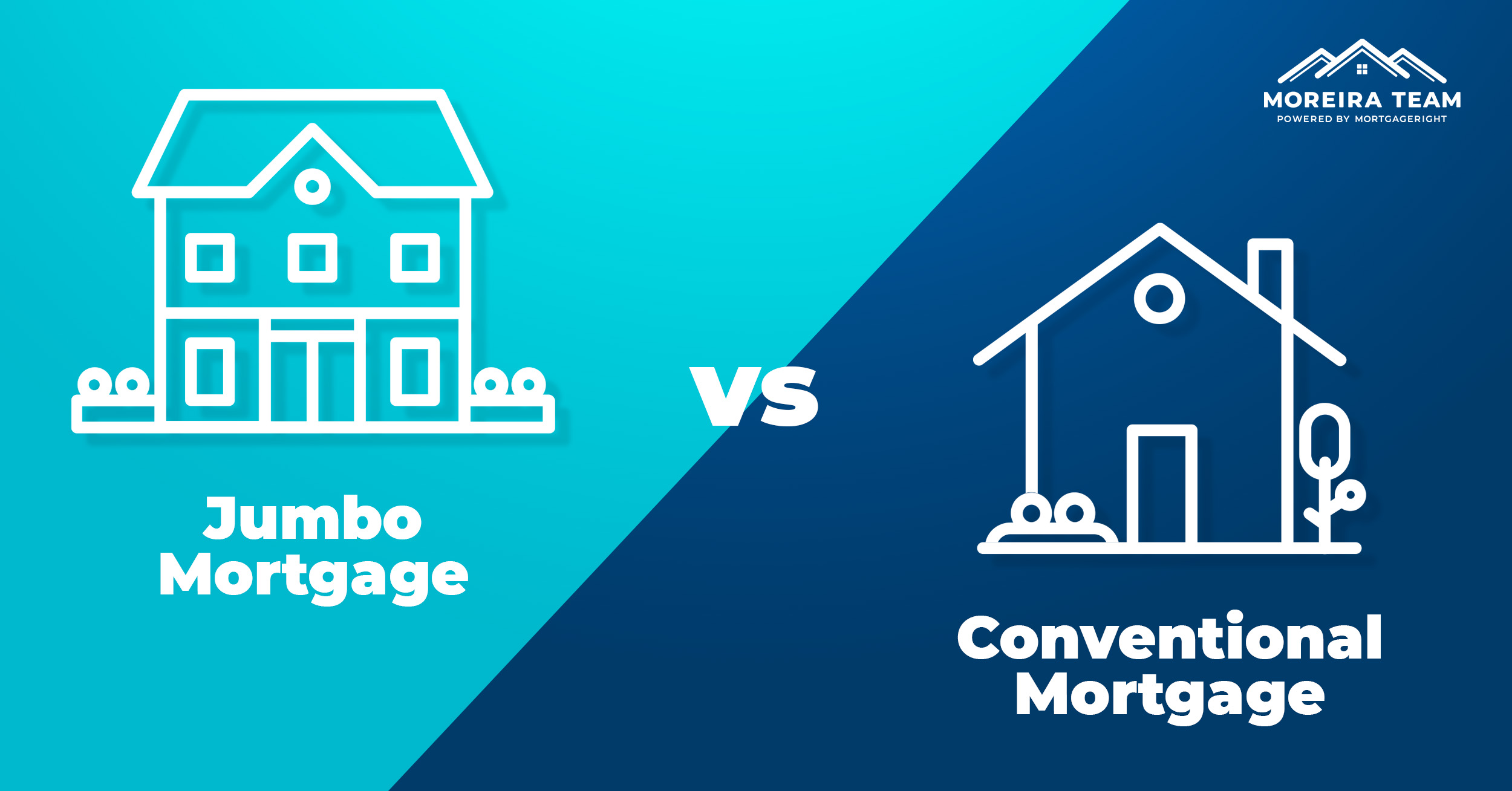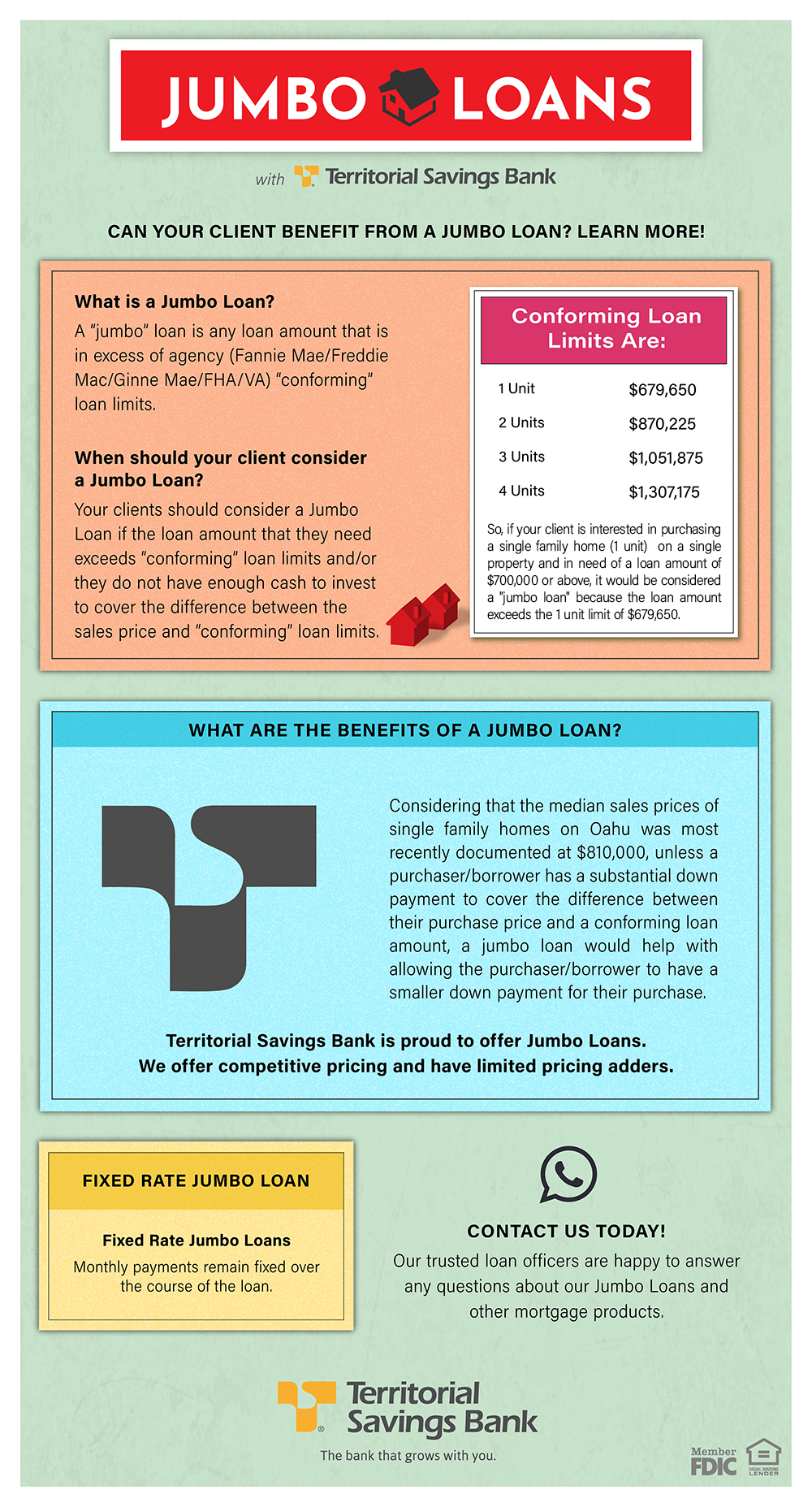Browsing the Jumbo Loan Refine: Expert Tips for Securing Your Dream Home
Browsing the Jumbo Loan Refine: Expert Tips for Securing Your Dream Home
Blog Article
The Impact of Jumbo Lendings on Your Financing Options: What You Need to Know Before Applying
Jumbo financings can play a pivotal duty fit your financing choices, particularly when it concerns acquiring high-value residential or commercial properties. While they provide the opportunity for larger loan amounts without the worry of private home mortgage insurance (PMI), they also feature rigid certification standards that need careful factor to consider. Understanding the balance in between the advantages and obstacles presented by these financings is vital for potential consumers. As you consider your choices, the ramifications of passion rates and product availability may motivate you to reassess your financial technique moving on (jumbo loan).
Understanding Jumbo Lendings
Comprehending Jumbo Loans needs a clear grasp of their unique features and demands. Big lendings are a sort of mortgage that exceeds the adjusting lending limitations established by the Federal Housing Financing Agency (FHFA) These limits differ by location yet usually cap at $647,200 in many locations, making jumbo fundings important for financing higher-priced residential properties.
One of the specifying features of big finances is that they are not qualified for purchase by Fannie Mae or Freddie Mac, which results in more stringent underwriting standards. Debtors should often demonstrate a higher credit report, normally above 700, and provide considerable documents of revenue and assets. Additionally, lenders may require a larger deposit-- often 20% or even more-- to mitigate threat.
Rate of interest on jumbo lendings can be somewhat greater than those for adhering financings due to the boosted risk thought by the lending institution. However, the absence of exclusive mortgage insurance coverage (PMI) can balance out several of these prices. Understanding these factors is critical for potential consumers, as they significantly affect the terms and expediency of protecting a jumbo car loan in today's competitive real estate market.
Advantages of Jumbo Loans
Jumbo financings offer distinctive benefits for homebuyers looking for to acquire high-value buildings that surpass standard car loan restrictions. Among the key benefits of big lendings is their ability to finance bigger quantities, permitting customers to obtain homes in costs markets without the restraints imposed by adjusting finance restrictions - jumbo loan. This versatility allows property buyers to see a broader range of properties that might better match their needs and choices
Additionally, jumbo finances usually come with affordable rates of interest, particularly for debtors with strong credit profiles. This can lead to significant cost savings over the life of the car loan, making homeownership extra inexpensive in the lengthy run. Furthermore, big lendings can be customized to match individual monetary situations, using numerous terms and amortization options that line up with the borrower's objectives.

Challenges of Jumbo Loans
Navigating the complexities of jumbo fundings provides numerous difficulties that prospective consumers must know prior to proceeding. One considerable obstacle is the strict borrowing requirements enforced by economic organizations. Unlike conforming car loans, jumbo loans are not backed by government-sponsored ventures, leading loan providers to take on more extensive standards. This often includes greater credit rating demands and significant paperwork to validate earnings and properties (jumbo loan).
Furthermore, big finances usually come with greater rate of interest compared to traditional loans. This elevated expense can considerably influence monthly settlements and overall price, making it necessary for debtors to very carefully analyze their economic circumstance. The down payment needs for jumbo fundings can be substantial, usually varying from 10% to 20% or more, which can be a barrier for lots of prospective homeowners.
Another difficulty depends on the limited availability of jumbo financing products, as not all lenders offer them. This can cause a lowered pool of alternatives, making it essential for customers to carry out complete research study and potentially look for specialized lenders. Overall, recognizing these difficulties is crucial for anyone thinking about a big car loan, as it makes sure informed decision-making and much better economic planning.
Certification Criteria
For those thinking about a jumbo financing, meeting the qualification criteria is a critical step in the application process. Unlike standard loans, big financings are not backed by federal government firms, leading to stricter requirements.
First of all, a strong credit scores rating is essential; most loan providers require a minimum rating of 700. A higher score not only increases your opportunities of approval however might also secure better rate of interest. In addition, consumers recommended you read are generally anticipated to show a significant revenue to ensure they can pleasantly manage greater month-to-month payments. A debt-to-income (DTI) proportion below 43% is normally favored, with lower proportions being more beneficial.
Deposit needs for big loans are additionally significant. Borrowers must prepare for taking down a minimum of 20% of the property's acquisition rate, although some loan providers may provide choices as reduced as 10%. Showing cash money gets is critical; loan providers often need evidence of adequate fluid assets to cover a number of months' worth of mortgage settlements.
Comparing Funding Options
When assessing funding options for high-value buildings, understanding the differences between different financing types is crucial. Big finances, which exceed adhering financing limits, typically featured more stringent qualifications and greater passion rates than conventional loans. These finances are not backed by government-sponsored enterprises, which raises the lending institution's risk and can lead to a lot more rigid underwriting standards.
In comparison, conventional financings supply more adaptability and are commonly easier to get for debtors with strong credit history profiles. They may feature lower interest rates and a wider variety of alternatives, such as taken care of or adjustable-rate mortgages. Furthermore, government-backed finances, like FHA or VA financings, supply possibilities for lower down settlements and more tolerant credit report needs, though they likewise enforce restrictions on the loan amounts.

Final Thought
Finally, jumbo finances existing both possibilities and difficulties for potential buyers seeking funding for high-value residential or commercial properties. While these car loans permit larger amounts without the worry of private mortgage insurance, they come with rigid credentials demands and prospective browse around this web-site downsides such as greater rates of interest. An extensive understanding of the benefits and difficulties related to big loans is vital for making informed choices that align with lasting monetary objectives and purposes in the realty market.

Report this page